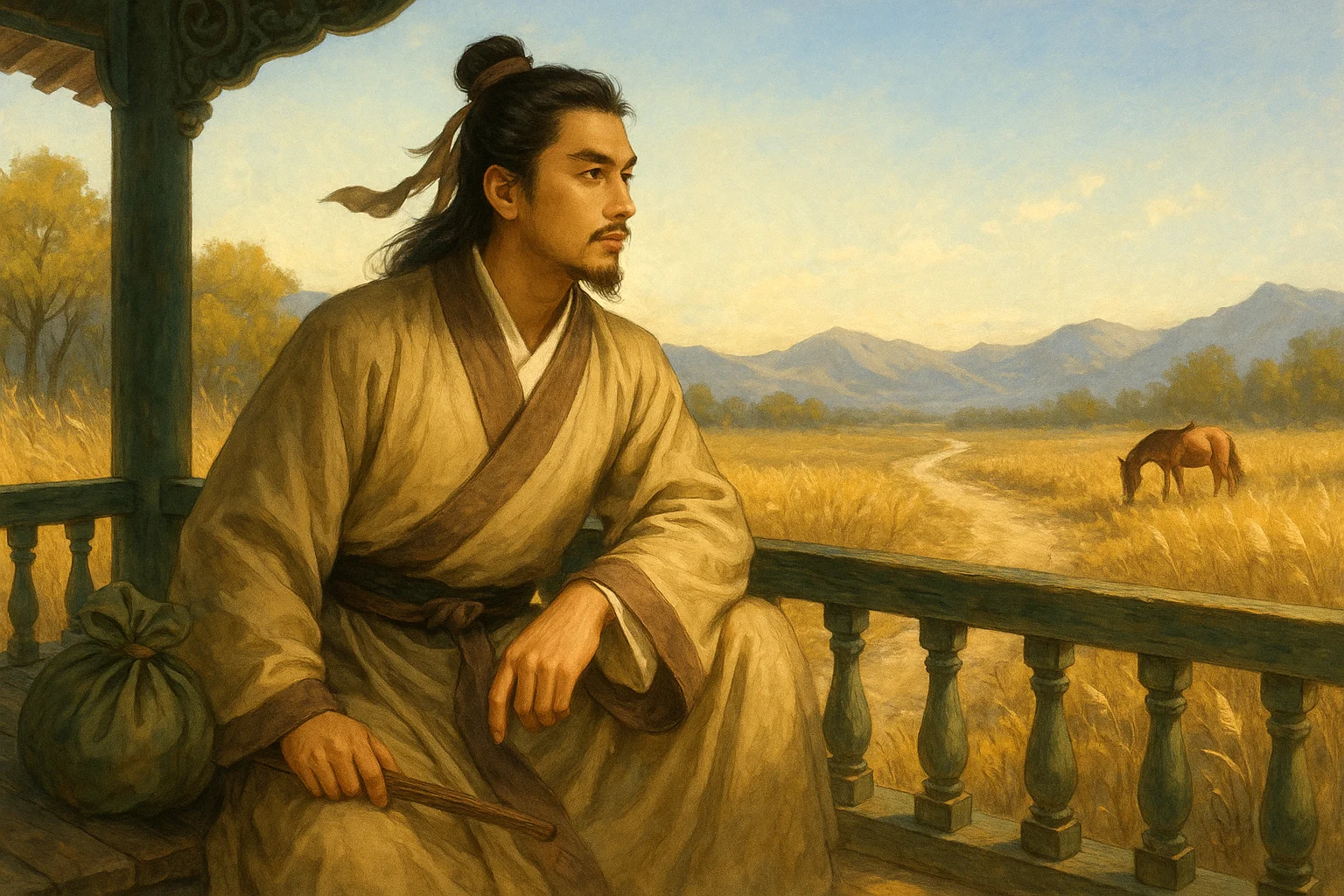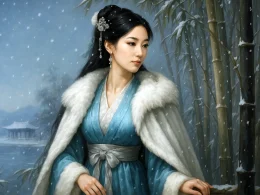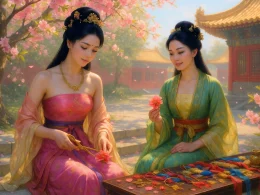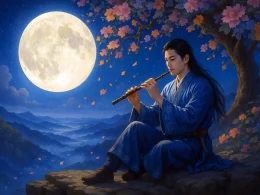Not melting where sunlit fields lie bare,
Alone it clings to pines in shadowed air.
Through twilight cold its gleam persists,
A silent friend to loneliness.
Original Poem
「松下雪」
司空曙
不随晴野尽,独向深松积。
落照入寒光,偏能伴幽寂。
Interpretation
This concise poem by Ouyang Xiu reflects his later years—a period of political disillusionment and reclusive tranquility. Composed likely during his retirement in Yingzhou or Yingyang, the work embodies his spiritual withdrawal from worldly affairs through the lens of nature. The title "Snow Beneath Pine Trees" evokes both physical seclusion and the poet's crystalline detachment, where winter's purity mirrors his clarified mindstate.
First Couplet: "不随晴野尽,独向深松积。"
Bù suí qíng yě jìn, dú xiàng shēn sōng jī.
Unlike snow on sunlit fields that fades— / It lingers alone under shadowed pines.
The opening juxtaposes ephemerality and permanence: while snow elsewhere melts under daylight, these sheltered accumulations endure—a metaphor for the poet's conscious retreat from society's "sunlit" bustle to contemplative solitude. The word "lingers" (积) suggests deliberate preservation of inner stillness.
Second Couplet: "落照入寒光,偏能伴幽寂。"
Luòzhào rù hán guāng, piān néng bàn yōu jì.
Setting sun infiltrates icy glare— / This very chill companions my serenity.
Here, waning light merges with snow's radiance to create a paradoxical warmth-in-coldness. "Companions" (伴) personifies the cold as a chosen ally, revealing how the poet transfigures isolation into spiritual intimacy. The couplet's acoustics—with sharp "i" sounds in "infiltrates" (入) and "icy" (寒)—sonically reinforce the scene's crisp clarity.
Holistic Appreciation
This exquisite dedicatory poem exemplifies the refined tradition of expressing noble aspirations through contemplative wandering. Eschewing dramatic narratives or turbulent emotions, it delicately frames a scholar's serene existence amidst nature's tranquility, using the soft palette of spring as its backdrop. The opening couplet unfolds with painterly grace—emerald grasses awakening to spring's touch, unhurried promenades along the marsh—establishing an atmosphere of crystalline purity and poetic distance. The second couplet employs twin metaphors of "wild butterflies" and "river gulls" to reveal the poet's harmonious yet vibrant inner landscape. A graceful transition in the third couplet contemplates human sorrows and the enlightened joy of inebriation, presenting life through the prism of philosophical detachment. The concluding lines artfully counter worldly ambitions with elegant irony, celebrating spiritual autonomy and intellectual self-sufficiency.
The composition honors the distinguished legacy of High Tang recluse poetry—embodied by masters like Meng Haoran and Wei Yingwu—where natural imagery and limpid diction convey transcendental serenity. While Sikong Shu's verse consistently communes with nature, it distinguishes itself through its elegant fusion of pastoral beauty with thoughtful self-reflection, as masterfully demonstrated herein.
Artistic Merits
- Lyrical Freshness, Crystalline Clarity:
The language achieves sublime simplicity through exquisite diction and balanced cadence, radiating an effortless sophistication free from artifice. - Scenic Emotionalism, Poetic Symbiosis:
Each natural element—from spring foliage to fluttering butterflies—transcends mere description to become vessels for the poet's philosophical contemplations and pastoral delights. - Epigrammatic Finale, Allusive Depth:
The "melon-selling noble" reference embodies the poet's erudition, simultaneously critiquing officialdom's caprices and affirming principled detachment with graceful wit.
Insights
This poetic gem offers more than a scholar's springtime reverie—it embodies the cultivated mindset of one who views worldly honors and setbacks with equanimity. The ancient literati ideal of maintaining intellectual independence through communion with nature and cultural refinement finds perfect expression in these lines. By likening this philosophical lifestyle to "butterflies dancing among blossoms" and "gulls skimming tranquil waters," the poet creates an enduring vision of harmonious existence that continues to inspire our pursuit of balance and self-realization in modern life.
About the poet

Sikong Shu (司空曙), c. 720 – c. 790, courtesy name Wenming, was a native of Guangping (present-day Yongnian County, Hebei Province). A renowned mid-Tang dynasty poet, he was one of the "Ten Literary Masters of the Dali Era," alongside Lu Lun, Qian Qi, Han Hong, Li Duan, and others. Though his life lacked illustrious achievements, his poetry—marked by genuine emotion in simplicity and profound contemplation in solitude—secured him a unique place in mid-Tang literary circles.












